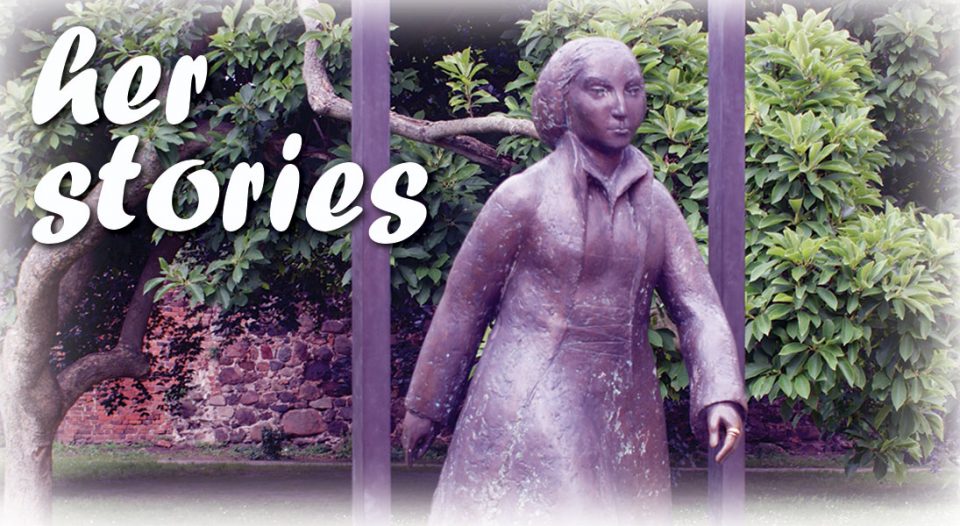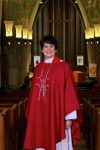Editor’s note: This story is a part of The Lutheran World Federation’s Her-stories global Lutheran storytelling project. If you have a story of how women have reformed the church or influenced your spiritual life, email it to justiceforwomen@elca.org with “Her-stories” in the subject line. Written stories can be up to 1,300 words. Audio/video can be up to five minutes. To learn more about Her-stories and submission guidelines, please click here.
This is my story and faith journey.
My mother and father were divorced when I was very young, and my mom and I moved in with my grandparents. My grandfather, the Rev. Walter Ruth, was a pastor. My experience of growing up in a parsonage was different from that of anyone else that I knew. My mom, grandpa and grandma were important to my everyday life and faith life.
As I grew, I became aware of how important my church family was to my faith development. Sunday school teachers helped me “tell the story of Jesus,” even at the age of 5. Mrs. Elsass, in particular, taught me that the church was more than a building; it was people who proclaim the love of God in Jesus in word and action and that our actions as Lutheran Christians speak louder than words. I learned Scripture verses that still guide me today. When asked, “What do you want to be when you grow up,” I would say, “a pastor!” “But girls can’t be pastors,” I was told over and over again. In the 1960s, when I was growing up in Ohio, women were not ordained, and there was no hope that we would ever be.
When friends and I played together, we played church. I would move chairs around and make a congregation of my friends, dolls and stuffed animals I would invite everyone to join the congregation for singing, praying, baptism and communion. Using a plate and cup from the kitchen along with white, plastic disks, communion was given every time we gathered. I knew God had a role for me in the church, and I believed it was as a pastor. But when I was asked what I wanted to be when I grew up, I was quickly reminded that “girls are not allowed to be pastors” and was told to “pick something else.”
First communion, confirmation, high school graduation – what are you going to study in college was the question. Law became my answer.
While attending the University of Arizona, I promised my mom I would find a church home so I became active in a Lutheran congregation in Tucson. I had found another loving congregation that adopted me for four years. During that time, the call to become a pastor was further and further from my thoughts. I had decided to become a lawyer, even though the American Lutheran Church and the Lutheran Church in America had voted in the mid-1970s to ordain women. I remember hearing the news but not really paying attention to it. “Women are pastors now” made little impact on me.
After graduation from college, I moved back home to prepare for law school. While there, our pastor asked if I would attend a one-day event about equipping the saints for lay ministry. I went. It was at that event that I heard the call to ordained ministry loud and clear. No longer was it something to hide from and run away from; it was too clear. Two presenters were newly ordained women who talked about their story. I could relate! Returning home, I told my mom and grandpa that I was going to seminary because I knew God was calling me into ministry. That summer I entered Trinity Lutheran Seminary in Columbus, Ohio, – the same seminary where my grandfather and father attended. While in seminary, several professors had a profound influence on my ministry: Dr. Ralph Doerman, Dr. Wally Taylor and Dr. – or as he preferred to be called – Pastor Bruce Schein. In May 1986, I graduated one of only several women that year in a class of more than 60 Master of Divinity and Masters of Arts in Theological Education graduates. This woman finally became a pastor!
My ministry has called me to four congregations and synodical work. I served congregations as solo pastor; co-pastor with my husband, the Rev. Brian Dillahunt; associate pastor; assistant to the bishop in the ELCA Southern Ohio Synod; and then elected bishop of the ELCA Southern Ohio Synod in June 2013. Women can be pastors and bishops and committed lay women!
My story is a faith story. I know God has called me in the waters of baptism and strengthened me for the work of ministry. Nothing is easy in life or the church, but I have always known, deep in my soul, God calls us to be in places of leadership when our gifts are needed.
We face challenges as a community of faith, but we have a “great cloud of witnesses” – Jesus Christ as Lord and Savior is our witness. I celebrate those in my life who encouraged me to listen to and respond to the call of ministry. Thanks to my mom, Carol Ruth Darcy; my grandpa, Walter H. Ruth; my grandma, Marguritte Ruth; my aunt, Joy Ruth Cohen; and my friends who did not laugh or make fun of me when we were in church or when I played church as a little girl but all said, “YES! Women can be pastors.” God calls and we respond.
Two Scriptures – one story, one verse – have been important in my life: Micah 6:8 and Luke 24:13-35, the road to Emmaus because we meet Jesus and often don’t know it. And we are to do justice, love kindness and walk humbly with our God.
What do you want to be when you grow up? If God is calling you, don’t ever give up.





